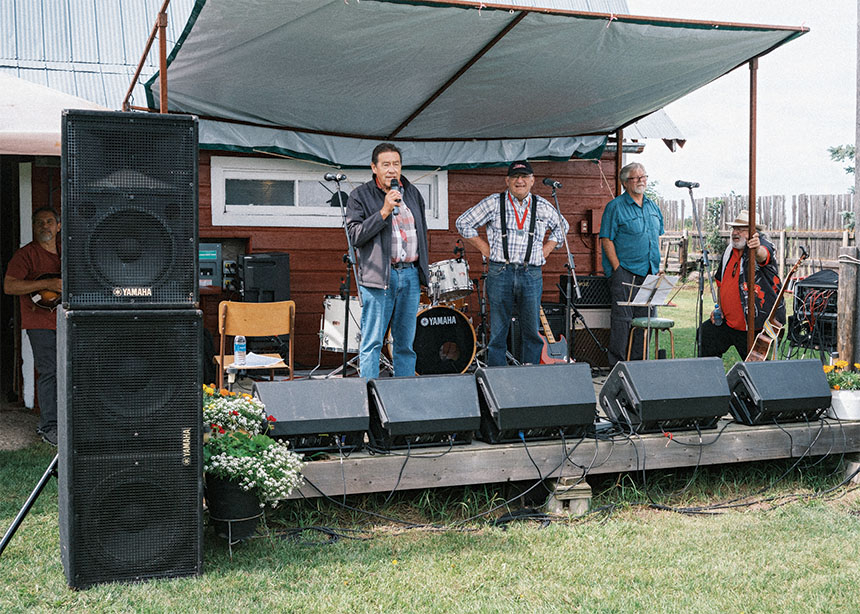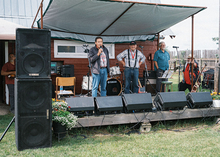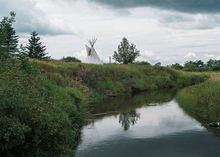Music is a universal language. In Saskatchewan, music is also the language of reconciliation. On August 15, the Spruce River Folk Fest was held to encourage friendship and understanding between Mennonites and Indigenous neighbours.
Ray Funk, who hosts the event on his farmyard near Spruce River, Saskatchewan, expressed excitement and relief at re-launching the event, which was last held in 2019. “It felt wonderful to again be able to organize a folk fest with an equal level of quality, participation and message proclamation as before COVID,” Funk said. “We certainly did notice the disappearance of some of the institutional connecting tissue that was there before COVID, particularly the closing of Grace Mennonite Church in Prince Albert. I suspect our church and missional life will become more project, mission and spirit-driven, and less reliant on institutional heft in the future.”
More than 150 attended the event, which raised over $5,000 for the Stoney Knoll Young Chippewayan Band. The story of the band was the subject of the award-winning 2017 documentary Reserve 107. The folk fest was launched to help raise funds and bring further awareness to the cause of the landless Young Chippewayan Band.
Gary Laplante, a descendant of the Young Chippewayan Band, opened the music festival by sharing the history of how his ancestors were given a piece of land near Laird, Saskatchewan, as part of the treaty with the Canadian government. The land was known as the Stoney Knoll reserve. The people faced desperate conditions and starvation and left the area in search of food and better living conditions. Shortly after, the Canadian government declared the prime farmland of Stoney Knoll to be “vacant” and “abandoned.” In 1887, the Stoney Knoll reserve was dissolved and the land was parceled out to Mennonite and Lutheran settlers.
“But,” Laplante emphasized, “the families wouldn’t let go of the story.”
It was the stubborn hope of the Young Chippewayan people that brought their descendants back to the Laird area to share the story of their stolen land.
While the journey had many challenges, rooted in fear and prejudice, the Young Chippewayans led the way to deep reconciliation with the Lutheran and Mennonite landholders. Laplante expressed his thankfulness for the close relationship that has developed between the groups. “Our prayers to the Creator were heard,” he said. “Our relationship together has a spiritual foundation. What’s happening here is grassroots reconciliation, which is way more meaningful than that political reconciliation that comes from Ottawa.”
It was this grassroots movement toward reconciliation that brought out crowds of people to listen to music and feast on bannock burgers and strawberry rhubarb pie. One attendee, Donna, from Saskatoon, said, “Truthfully, I’m not Mennonite or Indigenous, but I’m really interested in understanding more about reconciliation, so that’s why I’m here.” She explained that she had taken a class on Indigenous issues and wanted to learn more about what was happening. On her way home from a trip to the lake, she spotted the sign for the folk fest and decided she’d come. “It’s great to see so many people here,” she said.
The value of the folk fest remains significant because the Young Chippewayans’ land claim with the Canadian government is ongoing. In 2022, Ottawa confirmed that the band had met the minimum standards for a land claim. The government now has three years to decide how to proceed. The band was feeling hopeful that the government would make a decision soon about the claim. LaPlante says that prior to the federal cabinet shuffle in July, Marc Miller, who was Minister of Crown-Indigenous Relations at the time, said in a meeting with band representatives that he wanted the Stoney Knoll issue “dealt with in six months, not three years.”
While the appointment of a new minister, Gary Anandasangaree, may slow down the process, LaPlante says he’s still hopeful for good things to come.
Canadian Mennonite asked the minister’s office what steps have been taken with regards to the land claim and what the expected timeline is. In an email, Randy Legault-Rankin, spokesperson for Crown-Indigenous Relations and Northern Affairs Canada, said: “We recognize how important this land claim is to Stoney Knoll Young Chippewayan band and are actively working on it.”
Back at Spruce River, it is stubborn hope that fuels the daily efforts towards reconciliation and justice. “Today is about grassroots reconciliation,” said LaPlante. “It’s about friendship. We’re correcting the wrongs of the past, in a good way, through food and music.”
Funk echoed this too: “Working together and being patient does pay off.”






Add new comment
Canadian Mennonite invites comments and encourages constructive discussion about our content. Actual full names (first and last) are required. Comments are moderated and may be edited. They will not appear online until approved and will be posted during business hours. Some comments may be reproduced in print.